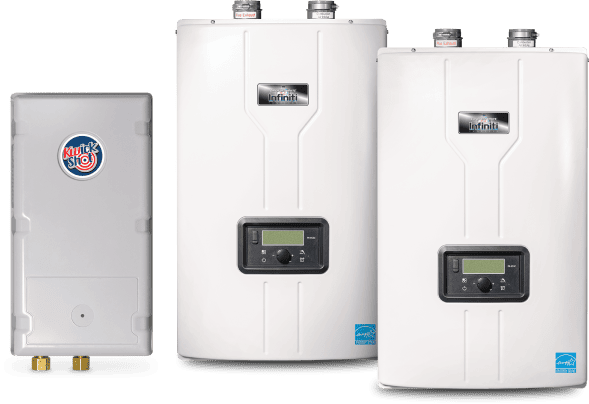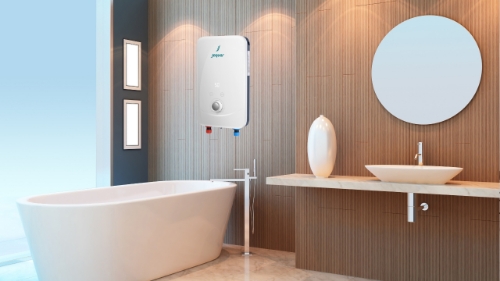Every person may have their private rationale in relation to Why You Should Consider a Tankless Water Heater.

In a world where comfort and performance reign supreme, it's no surprise that property owners are regularly on the lookout for smarter methods to manage their home's energy intake and comfort. One innovation that has steadily acquired popularity is the tankless water heater. But just what makes these systems stand out from the standard tank-based versions the majority of us grew up with? Allow's dive in and check out the benefits of tankless hot water heater, assisting you choose if it's time to make the button in your home.
Intro
Photo this: you enter the shower after a long day, anticipating a relaxing waterfall of hot water, just to be greeted by icy droplets because the last individual utilized everything up. Sound acquainted? Standard hot water heater keep a fixed quantity of hot water, indicating you go to the mercy of that tank's supply. Tankless systems, on the other hand, heat water on demand. No more going out mid-shower, no more wrestling with schedules just to ensure warm water is available.
Understanding Tankless Water Heaters
What Are Tankless Hot Water Heater?
Tankless hot water heater, sometimes known as on-demand or instant water heaters, provide warm water only as it's needed. Instead of saving gallons of pre-heated water, these devices kick into activity the moment you turn on the faucet. Water travels through a warm exchanger, heating up in real-time, suggesting you get an uninterrupted flow of warm water without the demand for a large storage tank sitting lazily by.
Just how Do They Differ from Conventional Equipments?
Conventional heating units hold a tank of hot water, making use of power to keep that storage tank at a regular temperature. Tankless systems remove the standing supply, minimizing thrown away energy and the bulky footprint of a huge cyndrical tube. Essentially, you're updating from a "stockpile" attitude to a "made-to-order" strategy.
Typical Types of Tankless Systems
Tankless water heaters usually are available in two selections: gas and electric. Gas versions have a tendency to supply higher circulation prices, suitable for bigger homes, while electrical models typically offer smaller homes and are generally much easier to mount. Additionally, some systems are created for point-of-use (serving one fixture) while others can handle the whole home's warm water needs.
Secret Benefits of Tankless Water Heaters
Power Efficiency and Price Cost Savings
No more heating a giant container's well worth of water and maintaining it toasty all day. Tankless heaters minimize standby energy losses, which can lower utility bills. While the initial cost might be greater, the long-lasting savings typically justify the investment.
3. Space-Saving Layout
If your home is short on storage, removing the large tank frees up useful space. Tankless systems are compact and can commonly be installed on walls, concealed in edges, or installed in tight energy closets without grabbing all of the whole room.
4. Longer Life-span
A well-maintained tankless water heater can outlast its tank-based cousin. Typical containers could last 10-15 years, while tankless versions can maintain chugging along for two decades or more, making them a strong investment with time.
1. Limitless Warm Water Supply
Ever before had to schedule showers so everybody obtains their fair share of warm water? With tankless, that becomes a distant memory. As long as the heating system's flow capacity isn't gone beyond, you can take back-to-back showers without turning into a popsicle.
5. Improved Water Top Quality
Keeping water in a storage tank can in some cases bring about debris buildup or a slightly "off" preference. With tankless systems, fresh water is warmed right away, decreasing the possibilities of debris build-up and potentially using cleaner-tasting water.
Factors to consider Before Switching
Though the advantages are compelling, it's wise to think about a couple of aspects before completely devoting.
Assessing Your Home's Water Usage Patterns
If your household simultaneously makes use of numerous fixtures with high warm water need, ensure the unit's circulation rate fulfills your demands. Understanding your usage patterns aids you pick the appropriate size and sort of tankless heating unit.
Maintenance and Treatment Tips
Tankless systems are relatively reduced maintenance, but they aren't set-it-and-forget-it appliances.
Routine Cleaning and Descaling
Difficult water minerals can accumulate in the warmth exchanger, impacting efficiency. Regular descaling (usually recommended every year) maintains the unit running at peak performance.
Annual Specialist Assessments
A yearly checkup from a professional ensures small issues are captured early. They'll evaluate the system's performance, seek leaks, and aid preserve ideal effectiveness.
Preliminary Financial Investment Expenses
Tankless heating systems typically feature a higher upfront cost. In between the device itself and prospective installation adjustments, the initial cost could provide you sticker label shock. Yet remember to view it as a long-lasting investment.
Installment Needs
Depending on your home's framework, you could require additional electric capacity or gas line upgrades. Guarantee you comprehend the installment requirements and talk to a professional to prevent surprises.
Guaranteeing Correct Air Flow
For gas designs, appropriate air flow is essential to securely eliminate exhaust gases. Ensure venting systems are clean and correctly set up to avoid any type of possible security dangers.
Comparing Different Brands and Designs
Not all tankless hot water heater are created equal.
Researching Trusted Suppliers
Try to find credible brand names with a history of producing quality systems. A trustworthy supplier typically gives far better consumer assistance and longer service warranties.
Installment: Do It Yourself or Specialist?
While some homeowners enjoy tackling jobs themselves, tankless installment may not be the very best time to burst out the tool kit.
Pros and Cons of Do It Yourself Setup
A do it yourself install can save cash, yet it includes risks. Inaccurate installation can cause inefficiency or security problems. If you're handy and have experience, it might be possible-- however wage caution.
Reviewing Reviews and User Comments
Customer reviews and responses from neighbors or good friends who have gone tankless can offer valuable understandings. Sometimes, real-life experiences can be extra telling than marketing sales brochures.
When to Call an Expert Plumber
For the majority of, calling a pro makes sure whatever's done correctly. A specialist plumbing professional understands regional codes, sizing demands, and venting parameters, reducing the danger of problems.
Maximizing Effectiveness
You have actually bought a tankless unit-- now optimize its efficiency.
Ideal Temperature Level Setups
Lots of people establish their devices in between 120-140 F. Changing the temperature can enhance comfort and cost savings. Experiment to discover a wonderful area that doesn't squander energy.
Pairing with Low-Flow Fixtures
Intend to extend your system's abilities? Take into consideration installing low-flow showerheads and taps. They minimize water usage, permitting your tankless system to supply a steady stream of hot water without stressing.
Environmental Effect
Tankless hot water heater line up with greener living goals.
Reduced Carbon Impact
By using less energy and only home heating water as needed, tankless systems can lower your home's carbon footprint, lowering your ecological impact.
Preserving Natural Resources
Less power intake and less thrown away hot water equate right into fewer natural resources being made use of, an ecological win-win.
Who Profits The Majority Of from Tankless Heaters?
The appeal of tankless heating systems is that they can suit a selection of houses.
Large Families vs. Single Residents
Big households could enjoy the unlimited hot water supply, while single occupants appreciate the power financial savings from not heating up an entire tank for simply a single person's morning shower.
House Owners with Minimal Area
If your home is short on square video, shedding the large storage tank frees up room for various other basics-- or perhaps simply a lot more elbow room.
Eco-Conscious Customers
Going tankless aligns with eco-friendly values, guaranteeing you're not throwing away power or resources.
Future Fads in Tankless Water Heaters
The globe of home appliances is ever-evolving, and tankless hot water heater are no exception.
Advancements in Innovation
R&D is constantly enhancing warmth exchangers, making units a lot more reliable and durable. Future models might be even quieter, a lot more portable, and better suited for varying environments.
Smart Home Integration
Think of adjusting your hot water heater's temperature level via an app or getting upkeep signals on your phone. As clever home tech developments, we'll see more connection and benefit.
Final thought
Picking a tankless water heater is more than just upgrading your home's hot water system; it's purchasing long-term comfort, energy effectiveness, and a greener lifestyle. By considering your family's water usage, bearing in mind setup demands, and dedicating to normal maintenance, you can appreciate a steady stream of hot water without the luggage of a large container. As technology advances, you can anticipate also smarter, extra efficient tankless options that not just make your life simpler however also benefit the planet.
Pros and Cons of Tankless Water Heaters
Tankless Water Heater Pros
Saves Energy: Simply put, you re spending less energy to create hot water, so your total carbon footprint goes down, not to mention your bills. Lasts Longer Than Storage Tanks: Storage tank units need to be replaced every 15 years or so. But tankless units? They can last for 30 years before they give out on you. Constant Hot Water: Need to take a shower and don t want the water running cold? Awesome it won t. The water will stay hot the entire time because it creates hot water on demand. Saves You Money: Less water usage equals less money. Beyond that, you re not paying to keep water hot 24/7. Those savings add up quickly. Better for the Environment: Less water waste is better for everyone. It saves you money, but it s also environmentally conscious at the same time. Tankless Water Heater Cons
It Can Take a Minute: Depending on your specific unit and its placement, it can take anywhere from 10 seconds to 2 minutes to fully heat up. Because there s no storage tank, it heats water as you need it. Upfront Purchase Price: While we talked about their longevity, there s sticker shock when you look at brand-new tankless units to install. It pays for itself, but it s still a big chunk of change at first. Has its Limits: If you run multiple appliances at once, such as the dishwasher, washing machine, and maybe you take a shower at the same time, there might not be enough hot water. https://www.airsouthnow.com/blog/water-heater-service/pros-and-cons-of-tankless-water-heaters/

I'm just very fascinated by Why You Should Consider a Tankless Water Heater and I hope you enjoyed our entry. Sharing is caring. Helping others is fun. Thank you for your time. Return soon.
Check It Out